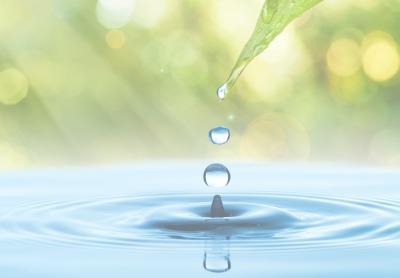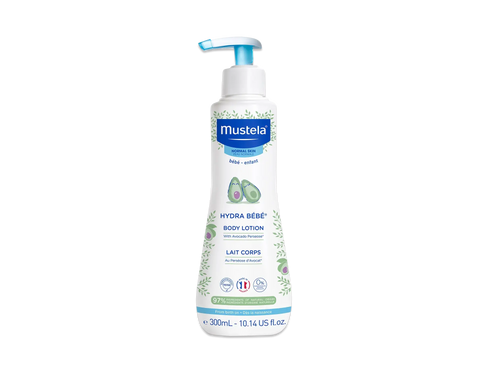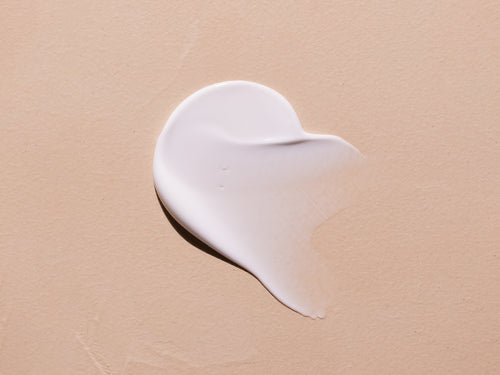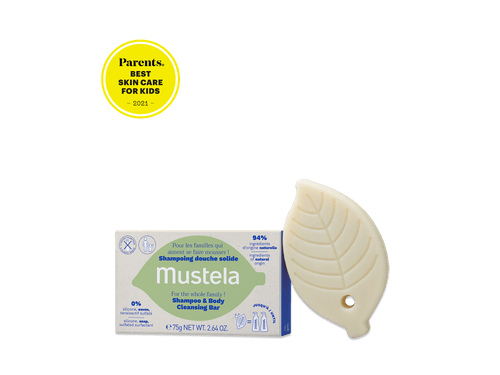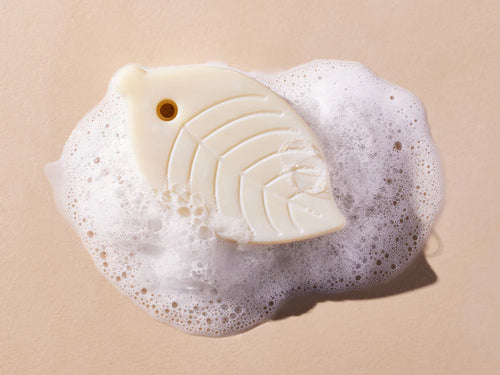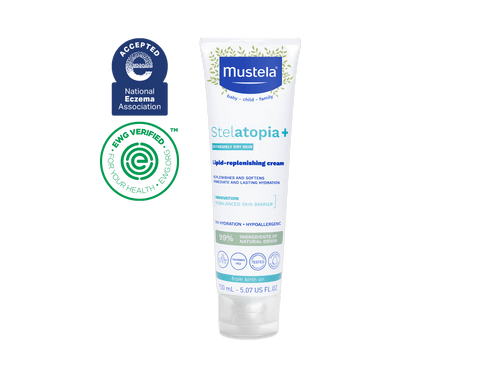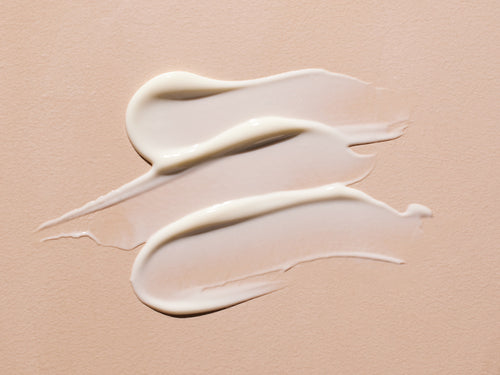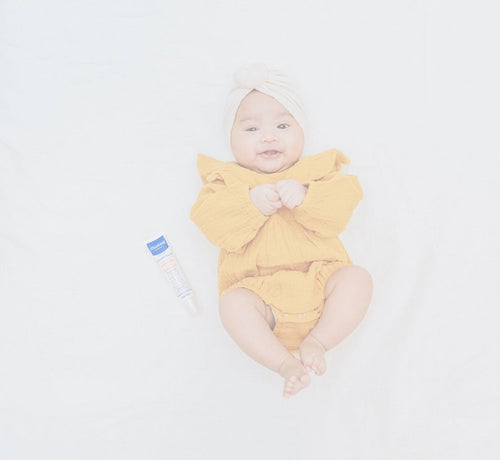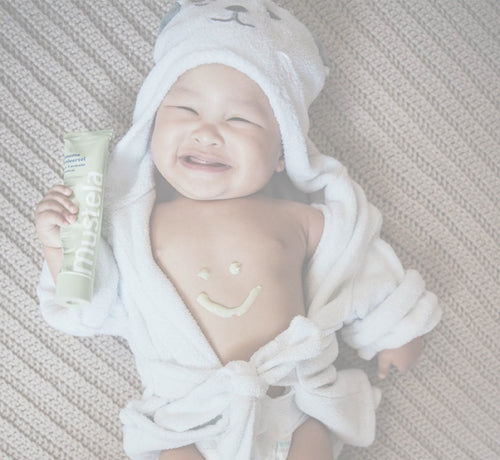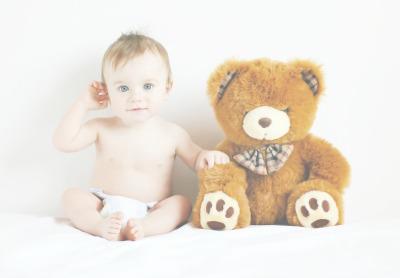You’ve probably heard of micellar water by now. Over the last few years, it’s been all the rage in the world of beauty products. While micellar water is fantastic for removing makeup and cleansing your face, it has many other applications that have yet to go mainstream.
One of the lesser-known benefits of micellar water is that it’s an easy, safe way to cleanse your baby’s skin!
In this post, the baby experts at Mustela share all the information you’ll need to know about micellar water. We’ll explain what it is, how it works, why it’s safe for babies, and how to use it. We’ll even mention a few other ways that you can put this multi-purpose product to work.
Here we go!
What Is Micellar Water?
Like so many other wonderful skincare products, micellar water was first created in Paris. The tap water in Paris is notoriously “hard” — meaning it’s high in minerals like calcium and magnesium.
Since hard water can be rough on skin and hair, the Parisians wanted a cleanser that didn’t require a tap water rinse after being rubbed on their skin. This spurred the development of micellar water.
Put simply, micellar water is a liquid cleanser that removes dirt and oil from your skin. What makes micellar water unique is that it doesn’t require lathering or rinsing.
Try to imagine a soap that cleanses your skin but doesn’t need to be lathered on or rinsed off after application! That’s micellar water, in a nutshell.
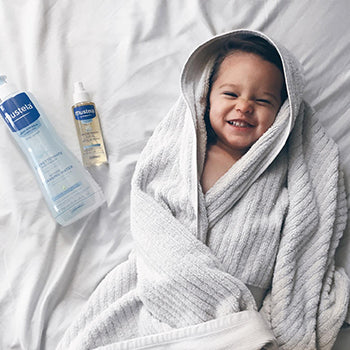
How Does Micellar Water Work?
It might be hard to believe that a cleanser can be effective without any lathering or rinsing, but it’s true! And there’s a fascinating scientific explanation behind micellar water’s cleansing power.
As the name might suggest, micellar water is a water solution that contains special molecules called micelles. These micelles are essentially magnets for oil and dirt.
When you wipe a cloth that has been dipped in micellar water across your skin, the tiny micelles drag all the gunk and grime away with them.
So, in short, micellar water sweeps all the dirt, makeup, and oil away from your skin without washing away the moisture or causing irritation.

Is Micellar Water Safe For Babies?
Now that we understand how micellar water works, it’s time to answer the question of whether or not it’s safe to use on your baby’s skin. Because as a parent, one of your most important jobs is to look at the ingredients in the skin care products you use on your baby.
So, is micellar water safe for your baby? The answer is yes, absolutely! One of the biggest advantages of micellar water is that most varieties are completely safe to use on your baby’s delicate skin.
It’s important that we emphasize the word “most” for a moment. Some micellar waters — especially those formulated for adults — may contain alcohol or other harmful ingredients.
These types of micellar water may cause discomfort on your baby’s easily irritated skin, so it’s best to avoid them. This is especially true for newborns and babies with extremely sensitive or dry skin.

In addition, some micellar waters may contain strong chemicals that are not safe to use on your baby. One of the chemicals you should watch out for is a surfactant called sodium lauryl sulfate (SLS) or sodium dodecyl sulfate (SDS).
Skincare products with SLS or SDS are (somewhat) safe for adults, but they shouldn’t be used on young children because they can irritate your baby’s skin and eyes.
Lastly, always avoid harsh chemicals, such as parabens, phenoxyethanol, and phthalates.
Let’s talk a bit more about questionable ingredients to be mindful of.
Ingredients To Avoid
Alcohol
Synthetic alcohol can be just plain drying to your or your baby’s skin and, in some cases, can cause skin allergies or sensitivities. However, not all alcohols are created equal, and there are some (called fatty alcohols) that can be good for your skin.
The only confusing part is that they may appear on the ingredient list with “alcohol” in their name.
How can you be sure that your skincare product doesn’t contain the bad sort of alcohol? Look for and avoid synthetic benzyl alcohol, synthetic phenethyl alcohol, SD alcohol, ethanol or ethyl, isopropyl, and methanol.
Sulfates
Sulfates are surfactants. This means that they are responsible for creating the suds and bubbles that leave you feeling squeaky clean. And it’s why sulfates are often found in products like shampoo.
Sulfates are a synthetic ingredient, and while they can be made from coconut oil or palm oil, they’re typically made from petroleum.
The first problem with sulfates is that they can be drying. In the process of cleansing, they do away with the natural oils that your skin needs to stay moisturized. They can also irritate sensitive skin.
There’s also particular concern about the sulfate SLES because its manufacturing process can involve a carcinogenic substance. No good. Fortunately, sulfates aren’t necessary to clean your skin well.
Steer clear of sodium lauryl sulfate (SLS), sodium laureth sulfate (SLES), and sodium dodecyl sulfate (SDS).
Parabens
Parabens are used in skincare products because they are an inexpensive and effective preservative, keeping products from growing unwanted mold and bacteria! This ingredient can be found in all sorts of products, including moisturizers, shampoos, sunscreen, and more.
The downside — and the reason that we refuse to use parabens here at Mustela — is that in your body, parabens mimic the hormone estrogen. This can be a health concern, and we think it’s better to stay away from the ingredient entirely.
Phenoxyethanol
Just like parabens, phenoxyethanol is used as a preservative. While it’s a good idea to keep bacteria far away from your skincare products, we don’t think that using phenoxyethanol is the safest way to do that.
The potential problems with this ingredient are almost too many to list. It’s an allergen, and the European Union classifies it as an irritant.
Even more incriminating, phenoxyethanol's Material Safety Data Sheet (MSDS) says that it’s harmful if swallowed, inhaled, or absorbed through the skin and that it can cause reproductive damage.
Need more reason to avoid phenoxyethanol? It can also have negative effects on the brain and nervous system and break down into a substance that’s a suspected carcinogen. We’ll stop there.
Phthalates
Phthalates are another chemical ingredient that’s a big no-no for us. They’re used in skincare products like soap, shampoo, and nail polish but also in things like toys, food packaging, and vinyl flooring. Why?
Phthalates are plasticizers, meaning that they make plastics more flexible and durable. In cosmetics, they make the product less stiff or are used to enhance the scent.
While studies aren’t conclusive, there are some red flags when it comes to the effects of phthalates on the human body. They could be endocrine disruptors, connected to neurodevelopmental disorders in children, and contribute to asthma and allergies in children.
You can see why we prefer not to use this ingredient.

Apart from products with harmful ingredients like the ones mentioned above, micellar water is completely safe to use on your baby. Because of the oil-grabbing properties of the micelle tails, micellar water is an extremely mild and gentle cleanser.
Take a look at the following three micellar water products that are safe for your little one (and you as well!).
Certified Organic Micellar Water With Olive Oil And Aloe
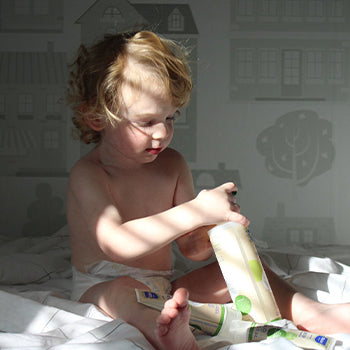
Our EWG Verified Certified Organic Micellar Water with Olive Oil and Aloe is not your average micellar water. In fact, it was given the Good Housekeeping award for sustainability.
It’s carefully formulated with only eight ingredients, 99.7% of which are naturally derived. Two of the key ingredients are organic aloe vera and organic olive oil.
The olive oil we use in this product (and the other products in our organic line) is sourced from family-owned olive groves in the South of France, where the olives undergo a cold-pressed extraction process to maximize potency and skin-nourishing properties.
This fragrance-free micellar water is good not only for your skin but also for the earth because it’s designed to be environmentally conscious, inside and out. The formula is biodegradable, and the packaging is made from sustainably sourced sugar cane.
Like our other micellar waters, it’s gentle enough for your baby’s skin and effective enough to add to your makeup-removing routine, too.
No Rinse Cleansing Water
If you’re looking for the perfect micellar water for your baby, look no further than Mustela’s No Rinse Cleansing Water. It’s an alcohol-free, hypoallergenic micellar water that’s been specially formulated for babies. It’s even safe to use on newborns!
A full 98% of its ingredients are of natural origin, including avocado perseose, a patented natural ingredient specifically designed to help protect your baby's delicate skin. It also contains aloe vera leaf extracts to soften and soothe.
Like all Mustela products, No Rinse Cleansing Water is free of parabens, phthalates, and phenoxyethanol. And it’s been tested under pediatric and dermatological control. So, you can always use Mustela’s No Rinse Cleansing Water with complete peace of mind.

No Rinse Soothing Cleansing Water
You can also try Mustela’s No Rinse Soothing Cleansing Water, which is a micellar water-based product for babies with sensitive skin.
It’s similar to our normal No Rinse Cleansing Water, but it is fragrance-free so that you can help soothe and protect your baby’s sensitive skin without worrying about added fragrances.
This gentle and hypoallergenic formula is specifically designed for little ones with sensitive, rashy, or reactive skin.
It’s composed of 99% natural ingredients, including avocado perseose, which we mentioned earlier, and Schizandra, a berry extract that soothes any skin tingling or tightness while also working to improve the skin’s appearance.
How Do You Use Micellar Water?
Now that we’ve gone over what micellar water is, how it works, and why most types are safe for babies, it’s time to explain exactly how to use it. Just follow these simple steps to use micellar water safely and effectively on your little one.
- Pump Mustela’s No Rinse Cleansing Water on your washcloth or cotton pad. Apply generously, but not so much that the fabric is dripping.
- Gently pat the saturated cloth onto the area of your baby’s body that you’d like to cleanse. Hold the cloth to your baby’s skin for 3-5 seconds.
- Wipe the wet cloth along the same area of your baby’s skin that you held the cloth to in Step 2. It’s OK to wipe the same area several times if necessary. (Remember, if you’re using micellar water to clean your baby’s diaper area, be sure to wipe from front to back!)
- Repeat steps 1-3 for all other parts of your baby’s skin that need to be cleansed.
That’s all there is to it! Using micellar water is as quick and easy as it is safe and effective. There are just a few additional tips you should know before getting started.
First, if you’re cleansing your baby’s diaper area, it’s best to use cotton pads rather than a washcloth. That way, you can throw each cotton pad away after using it.
Of course, you can use cotton pads to cleanse any part of your baby’s body. Just make sure to toss them in the trash after each use.

Second, if you prefer using a washcloth, make sure to use a soft, gentle cloth that won’t be too harsh on your baby’s delicate skin. Also, try to use different areas of the washcloth to cleanse different parts of your baby’s skin.
After one piece of the cloth has been used, it will have microscopic dirt and oil particles attached to it, so you wouldn’t want to rub that same piece of cloth against your baby’s skin again.
When Should You Use Micellar Water?
As we mentioned earlier, micellar water was developed to allow the men and women of Paris to cleanse their faces without having to use the city’s harsh tap water.
Nowadays, many women use it as a makeup remover or as a gentle cleanser for when a traditional lather-and-rinse cleansing isn’t possible.
But what about your little bundle of joy? When should you use micellar water on your baby? Micellar water can really come in handy:
- While changing your baby’s diaper. Micellar water is extra helpful after a particularly dirty diaper.
- When you’re traveling or going on vacation. Mustela’s No Rinse Cleansing Water comes in convenient 100ml bottles that are perfect for long trips or quick clean ups.
- When you don’t have time to go through your baby’s entire daily hygiene routine. Micellar water can’t completely replace baths, but it serves as an effective substitute when life gets hectic.
- If your baby has dry or eczema-prone skin. Bathing multiple times a day can remove moisture from your baby’s skin, so using Mustela’s No Rinse Soothing Cleansing Water can help keep your little one’s skin clean and hydrated between baths.
Micellar Water As A Makeup Remover
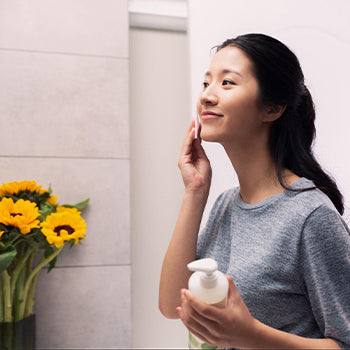
Up until now, we’ve focused mostly on how you can use micellar water to care for and cleanse your baby’s skin. But, as we mentioned, micellar water is also used by many as a makeup remover.
It’s perfect to use in a pinch when you’re out and about and can’t give your face a proper cleansing.
That said, when you’re at home, we recommend thoroughly removing makeup and using your routine facial cleanser, especially if you wear a lot of makeup. But micellar water is a great addition to your established face care routine.
Other Ways To Use Micellar Water
As you can see, there’s more than one way to use micellar water. And it doesn’t stop with cleansing your baby’s skin and removing your makeup!
For example, this multi-purpose product can be used to freshen up after the gym or to cleanse your hands when you don’t have access to soap and water. You can use it as a facial toner or to clean your makeup brushes, too.
Who knew micellar water could do so much? And it works its magic naturally, too!
Speaking of naturally, gently, and safely cleansing your and your baby’s skin, we’ll wrap up by mentioning a few other ways you can do just that.
After all, micellar water is especially useful in a pinch, but what other natural products can you use when it’s bath time at home?
Natural Cleansing Products
One of our favorite natural cleansing products is our Certified Organic Cleansing Gel with Olive Oil and Aloe, which is a gentle, sulfate-free hair and body wash. Made with 97.5% naturally derived ingredients, it gently cleanses without stripping your child’s skin of its healthy oils.
And, while this body wash is gentle enough for babies’ sensitive skin, it’s also effective enough for big kids and adults!
That said, we offer other cleansers that are designed for specific skincare needs. Our Gentle Cleansing Gel and Gentle Shampoo are for babies with normal skin, but we recommend Stelatopia Cleansing Gel for eczema-prone skin and EWG Verified Soothing Cleansing Gel for sensitive skin.
Stelatopia Cleansing Gel contains shea butter to soften and soothe your baby’s irritated skin, sunflower oil distillate to help maintain the skin’s moisture barrier, and plant-based glycerin to help lock in moisture for long-term relief.
Meanwhile, Soothing Cleansing Gel effectively cleans your baby’s body while also soothing sensitive, rashy, or reactive skin. The fragrance-free formula helps relieve bothersome symptoms of very sensitive skin, like tingling and tightness.
No matter your baby’s skin type, one of these cleansers will be the perfect bathtime companion at the end of a long, fun day.
Micellar Water For You And Your Little One

With so many different uses, micellar water is a must-have skincare product—for both you and your baby! It’s one of the few items that belong in your makeup bag and in your little one’s diaper bag.
For easy cleansing, choose any of our three micellar waters: Certified Organic Micellar Water with Olive Oil and Aloe, No Rinse Cleansing Water, or No Rinse Soothing Cleansing Water.
And now that the baby experts at Mustela have brought you up to speed, you can start putting micellar water to use in all the best ways!



